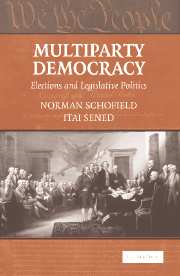Book contents
- Frontmatter
- Contents
- List of Tables and Figures
- Preface
- 1 Multiparty Democracy
- 2 Elections and Democracy
- 3 A Theory of Political Competition
- 4 Elections in Israel, 1988–1996
- 5 Elections in Italy, 1992–1996
- 6 Elections in the Netherlands, 1979–1981
- 7 Elections in Britain, 1979–2005
- 8 Political Realignments in the United States
- 9 Concluding Remarks
- References
- Index
- POLITICAL ECONOMY OF INSTITUTIONS AND DECISIONS
Preface
Published online by Cambridge University Press: 06 July 2010
- Frontmatter
- Contents
- List of Tables and Figures
- Preface
- 1 Multiparty Democracy
- 2 Elections and Democracy
- 3 A Theory of Political Competition
- 4 Elections in Israel, 1988–1996
- 5 Elections in Italy, 1992–1996
- 6 Elections in the Netherlands, 1979–1981
- 7 Elections in Britain, 1979–2005
- 8 Political Realignments in the United States
- 9 Concluding Remarks
- References
- Index
- POLITICAL ECONOMY OF INSTITUTIONS AND DECISIONS
Summary
This book closes a phase of a research program that has kept us busy for more than ten years. It sets out a theory of multiparty electoral politics and evaluates this theory with data from Israel, Italy, the Netherlands, Britain, and the United States.
Four decades ago, our teacher and mentor, William H. Riker, started this effort with The Theory of Political Coalitions (1962). What is perhaps not remembered now is that Riker's motivation in writing this book came from a question that he had raised in his much earlier book, Democracy in the United States (1953): Why did political competition in the United States seem to result in roughly equally sized political coalitions of disparate interests? His answer was that minimal-winning coalitions were efficient means of dividing the political spoil. This answer was, of course, not complete, because it left out elections—the method by which parties gain political power in a democracy. His later book, Positive Political Theory (1973), with Peter Ordeshook, summed up the theory available at that time, on two-party elections. The main conclusion was that parties would tend to converge to an electoral center—either the median or mean of the electoral distribution. Within a few years, this convenient theoretical conclusion was shown to be dependent on assumptions about the low dimension of the policy space. The chaos results that came in the 1970s were, however, only applicable to two-party elections where there was no voter uncertainty. With voter uncertainty, it was still presumed that the mean voter theorem would be valid.
- Type
- Chapter
- Information
- Multiparty DemocracyElections and Legislative Politics, pp. xix - xxiiPublisher: Cambridge University PressPrint publication year: 2006



